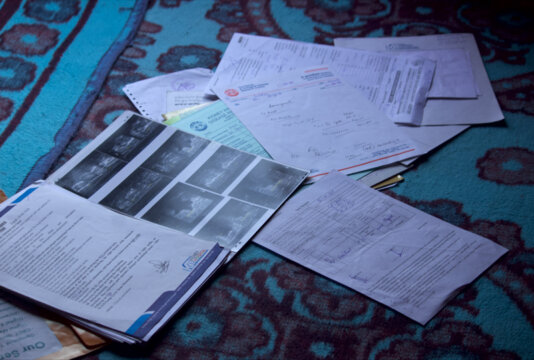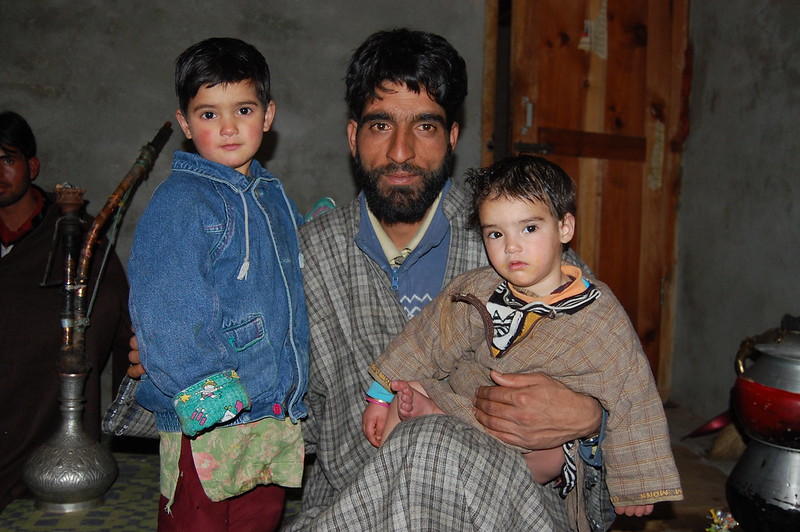- About
- Topics
- Story
- In-Depth
- Picks
- Opinion
- News
- Donate
- Signup for our newsletterOur Editors' Best Picks.Send
Read, Debate: Engage.
| May 23, 2022 | |
|---|---|
| topic: | Women's rights |
| tags: | #Kashmir, #women's rights, #breast cancer, #Mental health |
| located: | India |
| by: | Nusrat Sidiq |
Beenish Jan (35) sits in the corner of a rented room in Srinagar, the capital of Indian-administered Kashmir, where she is currently undergoing treatment for breast cancer.
Years earlier, Jan (an alias) mistook the symptoms of pain around her breast as a ‘casual affair’, thinking it is mere bodily pain that will subside on its own.
The pain persisted as the days went on, however, and Jan did not disclose it to her immediate family or close friends or seek medical attention to ascertain the cause of her suffering.
"It was always in the back of my mind that if I go to the doctor for testing there will be something wrong with my health, and then this thought bothered me: how would my relatives, neighbours and friends take it," Jan told FairPlanet.
After ignoring her palpable symptoms for almost a year, Jan was finally diagnosed with breast cancer in late December 2020, which brought her to the edge, she claims, impacting her both physically and mentally.
The disease, however, proved to be less lethal than the stigma around it, Jan said.
Jan had to move away from her ancestral village in Handwara in North Kashmir’s Baramulla District after her neighbours made "hurtful remarks" - an experience that nearly brought her to the brink of suicide. She said her neighbours thought that other women in the neighbourhood could catch the disease if they came in contact with her.
"I was like an untouchable woman for them," Jan said, recalling how often women in her village are looked down upon when they are afflicted by disease. "I had experiences where women in my own relations were stigmatised, bullied and even divorced for health reasons. I never wanted that fate," Jan said.
According to a 2017 study, breast cancer is one of the most stigmatised cancers all over the world. "It is because of the fact that it involves that part of a woman which is least discussed in public and in reference to Kashmir, it says stigma is an important sociological explanation behind the growing mortality of women with breast cancer. This factor discourages women from seeking help until it is too late," the researcher wrote.
The research further states that cultural myths and taboos play a significant role in strengthening this stigma.
In Kashmir, myths maintain that breast cancer is a communicable disease among women - a kind of punishment for some evil; a scar on women that has to remain hidden; a source of shame that must not be discussed among male family members, relatives or neighbours.
Dr Javvid Muzamil, an oncologist, said that due to these myths cancer is often perceived in Kashmir as a fatal disease that has no cure or treatment, which is rather incorrect. This, he claimed, compels people diagnosed with cancer to keep the diagnosis to themselves and not disclose it to their immediate family members or relatives, which puts them at even greater risk.
"They want to hide it somehow, in order not to face social rejection in terms of how others will perceive it," he told FairPlanet.
Dr Muzamil further stated that some breast cancer patients do not seek treatment at all to make sure that their daughter's marriage proposals are not rejected should someone come to know about their health condition. "Such is the level of the stigma that plays around with this disease."
Jan, the breast cancer patient, told FairPlanet that she has become physically and mentally very weak. "I cry and scream sometimes, I am depressed with my condition right now, I have lost my hair," Jan said, expressing her deep mental distress that is evidently caused by her fragile health and the overwhelming stigma surrounding her disease.
Alas, Jan said she receives no help for her mental well-being.
Often, women who go through chemotherapy cycles experience mental stress due to the loss of hair, muscle cramps, vomiting and diarrhea, according to mental health experts.
Dr Yasir Rather, a consulting Psychiatrist at the government run Mental Health Institute and Neurosciences (IMHANS) told FairPlanet that often such women don’t seek professional help for their mental health issues as this subject has been greatly stigmatised.
In Kashmir, people often look at mental health or the mental health institute as a place for people who went mad. "If someone avails of the help, he or she is perceived as ‘mad’ or the society or neighbourhood where they live perceive them differently," Dr Rather said.
He explained that it is very rare to see women undergoing treatment for the stress they experience due to their physical ailments, as stigma and lack of awareness discourage them from doing so. "It would have been great if these depressed women could get mental help from the hospitals or the health centres where they are getting treatments for the cancer," Dr Rather added.
However, there is no such facility available for such patients in hospitals. "We need mental health professionals and counsellors for these patients to help them fight out the anxiety and stress caused by the disease," Dr Muzamil said.
Breast cancer cases in Kashmir hit a record high last year, with 249 females diagnosed, as per hospital-based data. Prior to that, figures remained at 180-200 cases per year.
Alarmingly, Kashmir has a higher death rate of breast cancer patients compared to the rest of India, as per research studies. Breast cancer is the second-leading cancer after esophageal cancer among Kashmiri women, with a rate of 12.6 cases per 100,000 women.
Dr Shaqul Qamar Wani, associate professor of radiation oncology at the Tertiary Hospital in Srinagar, told FairPlanet that breast cancer rates among Kashmiri women have risen over the years, claiming that various factors are behind this increase.
"Unawareness and stigma are two main issues that keep our women in dilemma about the lethality of this disease," Dr Qamar said.
A 2020 cross-sectional study investigating the level of awareness of the disease among women in Fiji and Kashmir found that only 7.3 percent of Kashmiri women have breast cancer awareness compared to 57 percent of women in Fiji.
Dimple Bawa, a cancer survivor and the founder of a Delhi-based cancer support group called Cheers to Life Foundation, said that while cancer is a disease it is stigma and lack of awareness, that turn it to a death sentence. "I have counseled hundreds of women and observed women hide their condition to avoid social rejection," Bawa said, "they sometimes don’t tell their immediate family or husband, which later on proves fatal for them."
On 23 June, 2020, 49-year-old Gulshan Rashid woke up to a cracking pain around her left breast, sensing an unusual mass. Before dawn broke over the still waters of Kashmir’s famous Lake Dal, where Rashid dwelt in a modest houseboat along with her family, she restlessly brooded over the "inevitable."
"For at least one and a half months, I didn’t speak about it with my family, not even with my husband, because I felt if this turned out to be cancer, my family could not handle the financial burden of it," Rashid told FairPlanet at her home.
Rashid’s husband and their younger son, both Shikara riders, haven’t had much work since the Indian Hindu Nationalist Government led by Bharatiya Janata party revoked the limited autonomy of the region on 5 August, 2019. This put the local population of around 12 million under severe military and communications lockdown, which lasted for many months before the advent of the coronavirus pandemic in March 2020.
For decades, the Himalayan region has been a subject of dispute between India and Pakistan, which have fought two wars to claim the region. The prolonged conflict has had a devastating economic impact on locals, and a 2020 research indicated that poor financial conditions are one of the challenges encountered by women in the region when they get cancer.
The study also pointed out that the perceived worries are leaving women thinking about the disease and its fallout. The fears of Rashid came true following a medical test in early September 2020, which revealed that she suffered from an advanced stage of breast cancer.
"It was traumatic news. I couldn’t help but go into depression for many months, thinking about the financial costs of the treatment. It got worse when I actually [started] treatment for the disease," Rashid said.
After going through surgery, Rashid had half of her left breast removed while being on chemo. "The first time I got a panic attack was when my hair started to fall, it was really depressing to see that happening," Rashid said.
However, like Jan, Rashid has also not sought help from any mental health professional. Rashid said that if she would seek mental health treatment now, neighbours or relatives will make assumptions that she is not mentally fit. "They’d make a pity look at me, a very poor one which depresses me a lot," Rashid said.
Isha Malik, a clinical Psychologist, said that women with cancer or any other lethal disease are extremely prone to depression due to familial and societal pressures and stigma. "There is an urgent need to remove ignorance, stigma, financial constraints and taboos related to the diseases," Malik said.
By copying the embed code below, you agree to adhere to our republishing guidelines.



